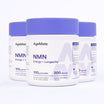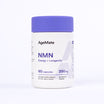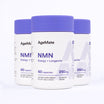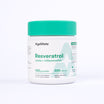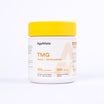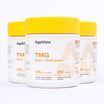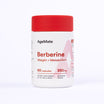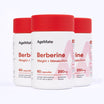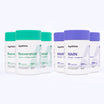Can NMN reverse grey hair? Let’s find out. Ageing is a natural and inevitable part of life. As we age, we experience various physical and physiological changes, and one of the most visible signs of ageing is the greying of hair.
Many people seek ways to slow down or even reverse this process. In recent years, a compound we know all too well, NMN (Nicotinamide Mononucleotide), has gained attention for its potential role in hair pigmentation restoration.
In this blog, we'll delve into the science behind grey hair and explore whether NMN has the potential to reverse it.
Understanding the Science of Grey Hair
Before we dive into NMN and its potential role in hair pigmentation, let's first understand why our hair turns grey as we age. The colour of our hair is primarily determined by melanin, a pigment produced by melanocytes in hair follicles. There are two types of melanin: eumelanin, which is responsible for black and brown colours, and pheomelanin, which is responsible for red and yellow colours.
As we age, several factors contribute to the greying of hair:
1. Decline in Melanocyte Activity
Aging reduces melanocyte function, which results in decreased melanin production (R).
2. Genetic Factors
Genetics significantly determines when and how quickly your hair turns grey. If your parents or grandparents experienced premature greying, you may also be more likely to do so (R).
3. Oxidative Stress
The accumulation of free radicals and oxidative stress over time can damage melanocytes and disrupt melanin production (R).
4. Hormonal Changes
Changes in hormonal levels, particularly in menopause or andropause, can influence hair pigmentation (R).
The Role of NMN in Greying Hair
NMN is a molecule that plays a crucial role in the production of a compound called NAD+ (Nicotinamide Adenine Dinucleotide). NAD+ is essential for various cellular processes, including DNA repair, energy production, and the regulation of oxidative stress. It is also closely linked to aging, as NAD+ levels tend to decline as we age (R).
Some studies suggest that raising NAD+ levels may have several potential benefits, including energy metabolism and longevity improvements. Since oxidative stress and DNA damage are implicated in the greying of hair, researchers have started exploring whether NMN and the subsequent increase in NAD+ could reverse grey hair (R).
The Evidence: Can NMN Reverse Grey Hair?
While the potential link between NMN and hair pigmentation restoration is intriguing, it's important to note that the research in this area is still in its early stages and, ironically, grey at best. Conclusive, direct evidence is lacking. That said, there have been a few mouse studies that have shown linkage with promising results:
Mouse Studies: Mouse studies indicate that supplementing older mice with NMN restored their NAD+ levels, improved mitochondrial function, and reversed some age-related signs, which may include hair loss and greying (R, R, R).
It's crucial to emphasise that these studies involve animal models, are correlational, and the translation of their findings to humans is complex. Human studies are necessary to determine the safety and efficacy of NMN supplementation for hair pigmentation restoration.
At AgeMate, we also have hundreds of customers who have provided feedback. We have seen cases of some customers saying it has reduced their grey hairs. At this stage, it is anecdotal but also important to note.
Current State of NMN Research
The research on NMN and its potential effects on ageing, including hair pigmentation, is ongoing. Currently, there are no substantial human clinical trials providing concrete evidence of NMN's effectiveness in reversing grey hair. That said, current animal studies suggest we should watch this space.
Natural Ways to Maintain Hair Health
While the science of NMN and its potential role in reversing grey hair is still emerging, there are other proven strategies you can adopt to maintain the health and appearance of your hair as you age:
- Balanced Diet: A diet rich in vitamins, minerals, and antioxidants can support hair health. Include fruits, vegetables, lean proteins, and healthy fats (R).
- Manage Stress: Chronic stress can contribute to premature greying. Practice stress-reduction techniques like meditation, yoga, or deep breathing exercises (R).
- Good Hair Care: Use gentle hair care products and avoid excessive heat and chemical treatments that can damage your hair (R).
- Stay Hydrated: Proper hydration is essential for hair health (R).
- Regular Exercise: Physical activity promotes good circulation, which can benefit hair follicles (R).
- Proper Sleep: Ensure adequate and restful sleep to support overall health, including your hair (R).
- Consult a Professional: If you're concerned about hair loss or greying, consult a dermatologist or healthcare provider for guidance and potential treatments.
In Conclusion
The potential for NMN to reverse grey hair is an exciting area of research, but it's not yet a proven or established solution. While some animal studies have shown promising results, more research, particularly in human clinical trials, is needed to confirm these findings and determine the safety and efficacy of NMN for hair pigmentation restoration.
In the meantime, focus on maintaining overall health through a balanced lifestyle, diet, and stress management. If you're considering NMN supplementation or any other intervention for hair pigmentation, consult with a healthcare professional to make informed decisions about your health and well-being.



